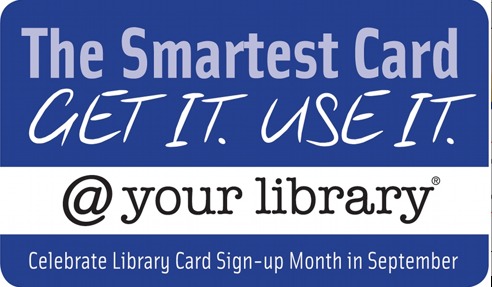Reducing Book Clutter (Part 4): Borrowing Returning–A Library Love Letter
“Whatever the cost of our libraries, the price is cheap compared to that of an ignorant nation.”
~ Walter Cronkite
“Libraries will get you through times of no money better than money will get you through times of no libraries.”
~ Anne Herbert
“There is not such a cradle of democracy upon the earth as the Free Public Library, this republic of letters, where neither rank, office nor wealth receives the slightest consideration.”
~ Andrew Carnegie
Over the last few weeks, we’ve talked about how to reduce the clutter of books in your space by changing the method of acquisition. First, we reviewed renting books for adults and children, and then we discussed the merits of participating in book swapping web sites. Starting next week, we’ll look at ways of changing the actual formats (audio, electronic, etc.) of books to help reduce book clutter.

September is National Library Card Sign-up Month, and in its honor, today, before we go onward with more high tech solutions, we’re going to cover one more old school option: libraries!
Paper Doll has a special affection for libraries. From the day after I turned 16 until I left for college, I was a page in at Williamsville, New York’s Clearfield Public Library. As much as I love being a professional organizer, I cannot imagine a better job than page. I got to organized books! Patrons returned books to the front desk and the giant, echo-y, outdoor metal book bin, and abandoned unshelved titles willy-nilly all over the library. We pages got to put books away, reorganize the shelves, make recommendations, and help readers check out.
Indeed, the only thing that ever saddened me about working in the public library was working at the check-out desk and hearing a parent stifle a whining, begging child by hissing “No! You have enough books!” While I now realize most of these overburdened moms and dads were probably thinking of the clutter of lost books and late fines, Paper Doll could only wonder what that strange phrase could possibly mean. “Enough books?” Enough books, like enough chocolate or enough George Clooney, still puzzles me.
LIBRARY WOES
In recent posts, I’ve touched on some of the drawbacks of libraries (besides all that shushing). In a bad economy, patrons turn to their libraries to save money while satisfying a collective literary sweet-tooth. The problem? Those same economic downturns lead municipal governments to chip away at the budgets for libraries, meaning, as we’ve said before, curtailed branch hours, reduced staffing at libraries, reduced acquisitions of new titles and fewer circulating copies.
Paper Doll can only imagine what Benjamin Franklin, founder of Philadelphia’s first lending library, would have thought if he’d time traveled here in the past year or so. In 2009, Philadelphia’s proposed (but defeated) Plan C budget would have forced the closing of the entire Philadelphia Free Library system! And what would old Ben have thought if he’d heard Fox Chicago News’ conjecture that libraries might be a waste of public money! Of course, one imagines his chagrin would have been tempered by pride in the response from Mary Dempsey, Chicago’s Public Library Commissioner, whose every word Paper Doll advises savoring.
Nonetheless, budget issues aside, at least while our libraries stand, they are an excellent source of information, education, entertainment and culture, and today’s post is as much a love letter to the concept of libraries as it is an exploration of another alternative method for conquering book clutter. Thus onward to borrowing…and returning…library books.
THE BASICS
Unlike the recent posts, there aren’t a lot of complicated instructions for making use of your library. In fact, you almost certainly know what to do:
1) Find your local library system/branch.
2) Acquire a library card, if you don’t already have one. Anyone can use a public library, but to borrow books and other items, you’ll need a card, and to get a card, you’ll need proof of identity and of residence in that city, town, county or parish. Usually, a picture ID bearing your address or a combination of ID and postal mail sent to you at that address will suffice. If you live outside the community your preferred library serves, you can usually acquire a card for a small fee — less than the cost of one hardcover book.
3) Borrow books (as well as magazines, CDs, DVDs and any other resources your library has in its collections) for periods ranging from one week to one month. Many library systems will let you renew books and put books on hold online, using your library card account number.
4) Return items on time. Public library late fines generally vary from as little as five cents to about a quarter, per day–not much for one book, but if you’ve got a dozen books out at a time and have a propensity towards forgetting to return them, the costs can mount.
KEEPING TRACK OF YOUR LIBRARY BOOKS
A few weeks ago, I noted that one way to avoid losing track of borrowed library books (especially children’s books) is to designate one shelf or table where all borrowed items live. Teach your children and family members to return items to that space when the reading, listening, watching or playing is over. This decreases the likelihood of titles getting lost or mixed in with family possessions and increases the chance that items will be returned on time.
An alternative, one that’s admittedly more likely to work if you’re a solo borrower and not the keeper of the family’s borrowed treasure, is to keep all library books — except the one currently being read — in an official library book bag or tote. Yes, you still might misplace one book, but it keeps the others from getting buried under household clutter.
Paper Doll is generally in favor of totally-free access to books. However, if you have multiple children close to the same age, who tend to read (and misplace) the same books and blame the losses on one another, you might want to develop an in-house library system. Yes, it means a little more labor for mom and dad, but it helps teach responsibility. Keep all the books in one location, preferably out of easy reach of the kids, and have them “sign out” books they want to read and sign them back in again, so it’s at least clear who last had any given book…though it still won’t magically find one your child has left on the bus.
There are a variety of ways to remind yourself to return your library books. Some simple options:
–Before leaving the library with your books, set an alarm on your cell phone or PDA for the day BEFORE the library books are due. (Depending on whether you’ve borrowed 7-day and 28-day books, you might have a few different due dates.)
–Before leaving the library, use Remember the Milk or any of the many varieties of online To-Do sites to remind you when to return the books.
–Once you get home, post the charge sheet (the little receipt your library gives you, noting the dates) on your family bulletin board and/or mark the dates on the family calendar.
–If you tend to borrow so frequently that you’ve got dozens of books with numerous due dates out at once, set a recurring weekly alarm on your phone or task on your computer to log into your library’s online account. You may still miss a date or two, but by a day rather than a full week.
–Get in the habit of visiting the library on the same day each week. Regular rituals not only get your children in the lifelong habit of reading and library-going, but will make the whole borrow-and-return process more ingrained.
–Ask a little elf for help:

Library Elf is an internet service designed to help library patrons keep track of what they’ve borrowed and when items are (or were) due. The service is available in the United States and Canada, as well as for some patrons in the UK, Australia and New Zealand.
Library Elf has two levels of service. At the basic (free) level, any one single user gets email alerts of books that are due or overdue (according the notification frequency they’ve specified). Premium users can keep track of multiple cards/accounts and receive additional benefits: RSS feeds, text message alerts for titles on hold that have become available, iCal and Elf calendars with borrowing summaries, and email support.
Premium membership costs $12/year to monitor one library card or $20/year to oversee multiple cards. New users receive a free trial period (three weeks or 6 alerts) at the premium level, after which service continues at the basic level unless a user opts to upgrade.
Library Elf has partnered with numerous “subscriber” library systems around the country. Is yours one of them? Patrons who register through libraries that are already Library Elf subscribers receive the multiple-card premium service at no cost.
(Paper Doll wonders if perhaps it’s not quite in the best interest of libraries to be too active in reminding patrons of their overdue books. Aren’t their budgets somewhat dependent on fines? Then again, what institution embodies the concept of selflessness as much as the public library?)
THE LIBRARY ANNEX: THE EXTRAS
In addition to libraries being the perfect source of reading (and other) material with a built-in deadline that encourages you to frequently gather your book clutter and remove it (even if only temporarily, until you acquire more books), your public library system is a source of magnificence.
The American Library Association’s list of 52 Ways To Use Your Library Card and SavingAdvice.com’s Jennifer Derrick’s 27 Free Things At the Library are a great start, but I invite all of my readers to share their favorite, even unexpected, library offerings. Whether your library means a place to discover books on topics you didn’t know existed or a quiet, air conditioned locale to check today’s newspaper, whether it’s a venue to take a workshop on organizing or a cozy nook to take your children for story hour…what does your library mean to you?
And just to show that even libraries are sometimes at a loss as to what to do with extra or outdated books that will likely go unread, the library at the University of Delft in The Netherlands boasts a reference desk made of repurposed books:

Finally, another library-related way you can declutter your collection of books and magazines? Donate them to your public library system’s annual book sale. The revenue from selling your books helps fund all of the great programs at the library, and you have the benefit of getting a tax deduction while decluttering your home of the reading material you’re not likely to revisit.
Next week, we continue our book-loving saga with the digital side of reading. The plan for the remainder of this blog series is to focus on no-cost and lost options, so even if you’ve never listened to an audio book or think reading a book on a screen is sacrilege, I hope you’ll be back for more.




Follow Me